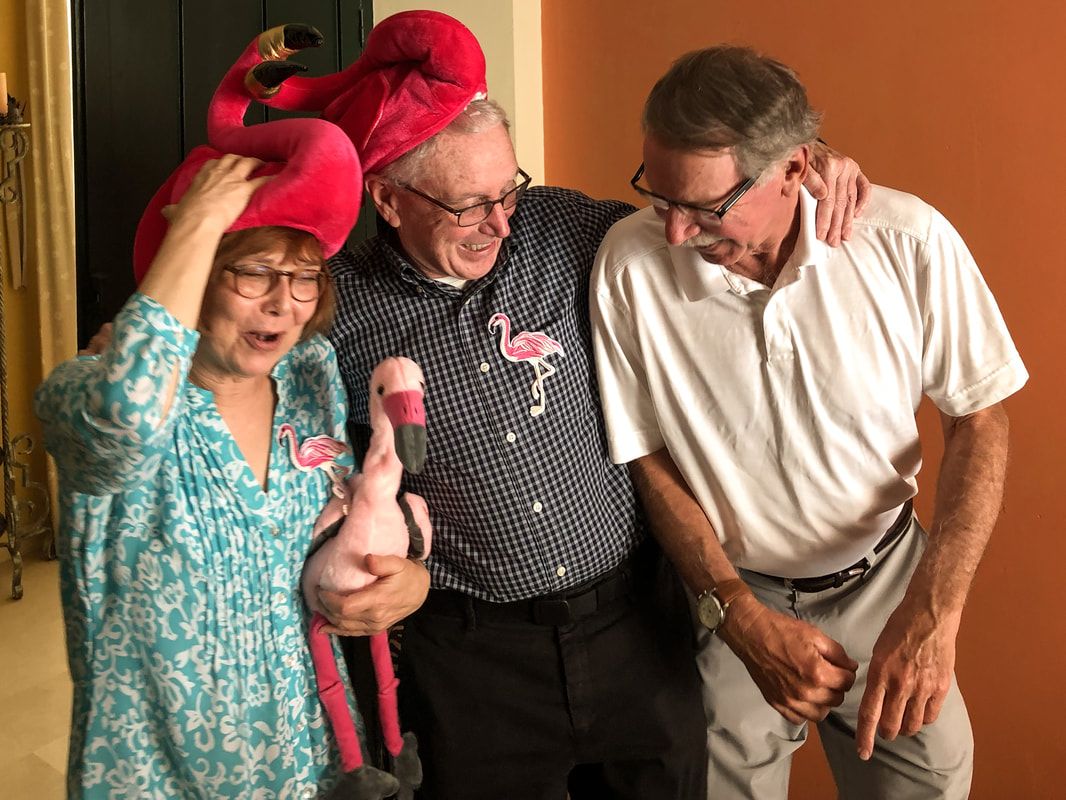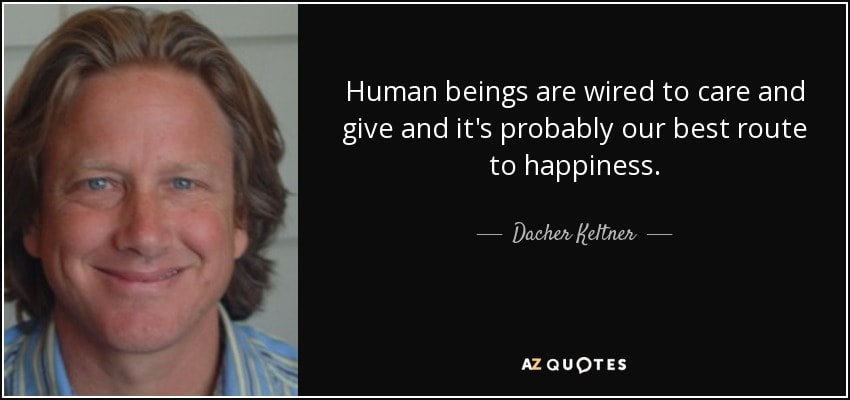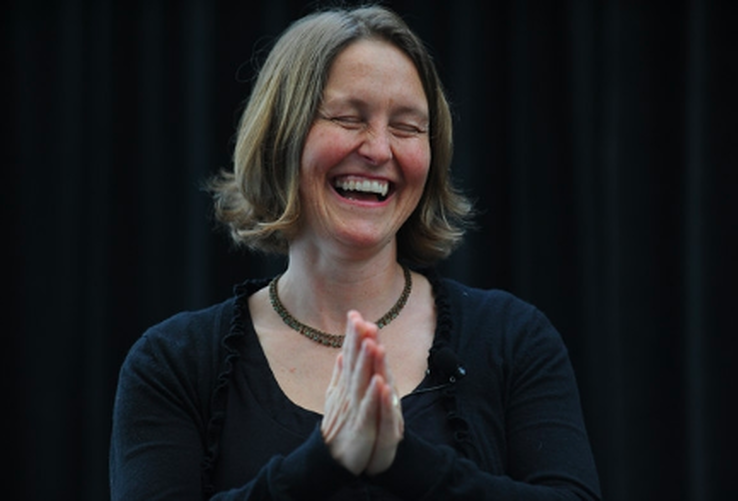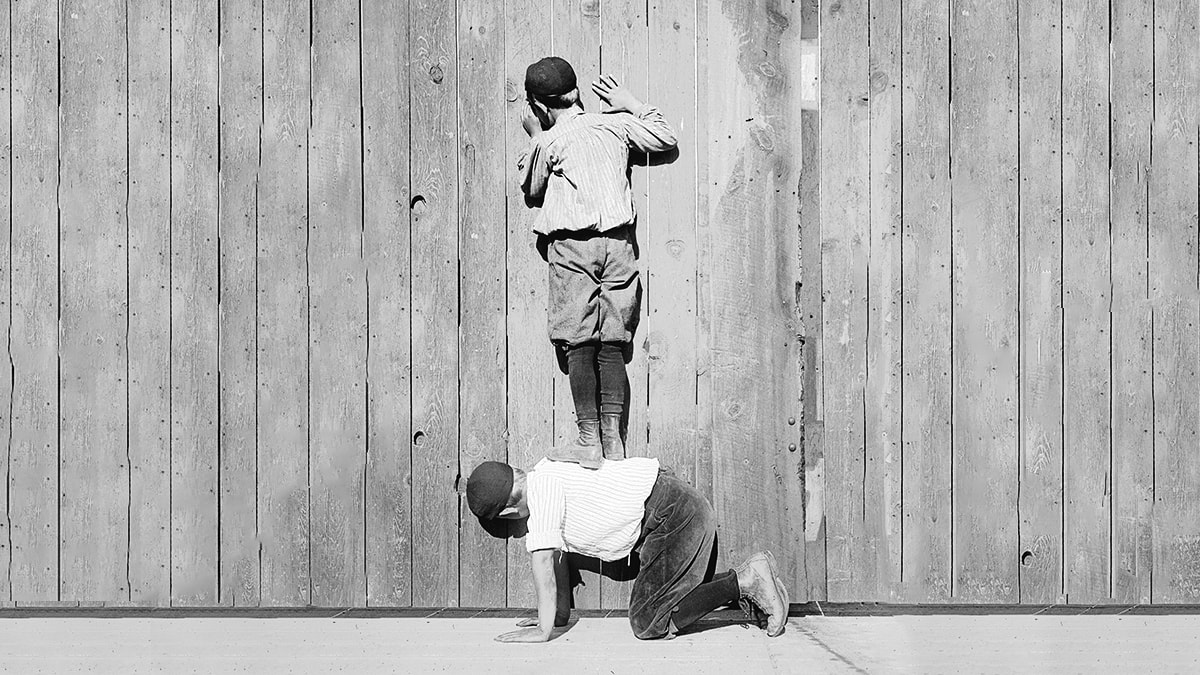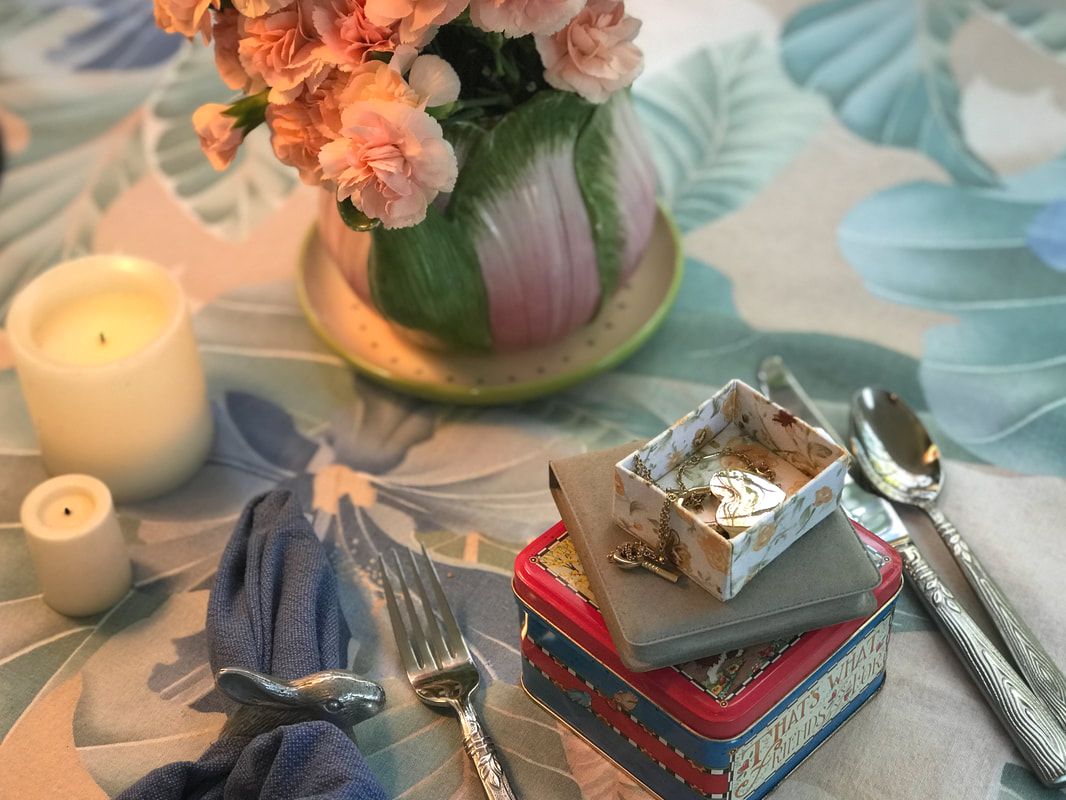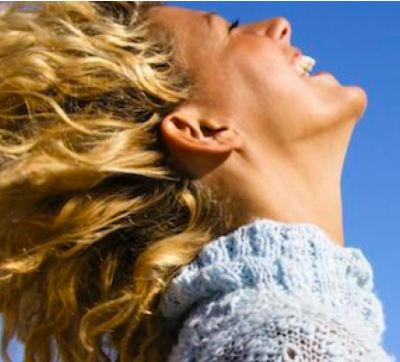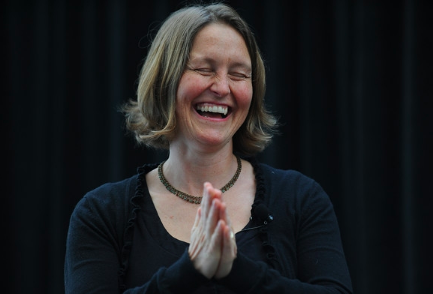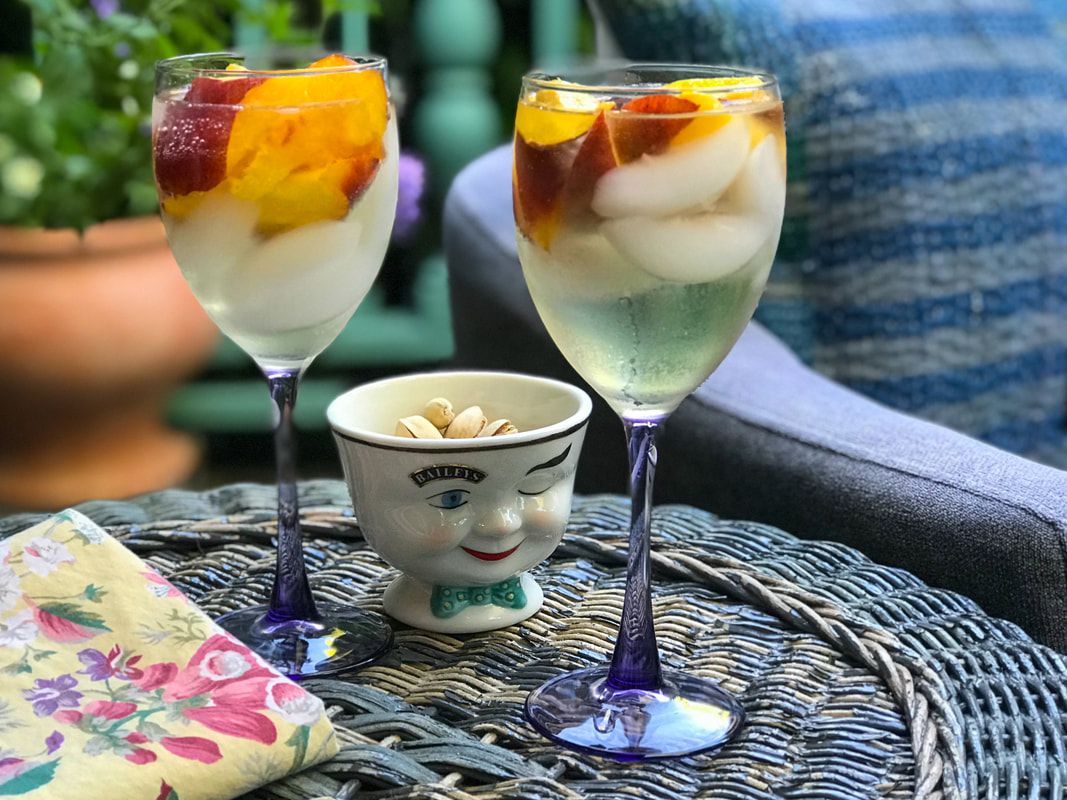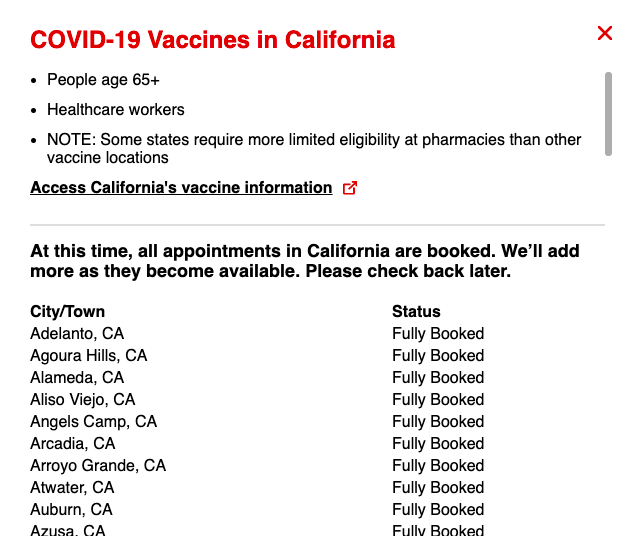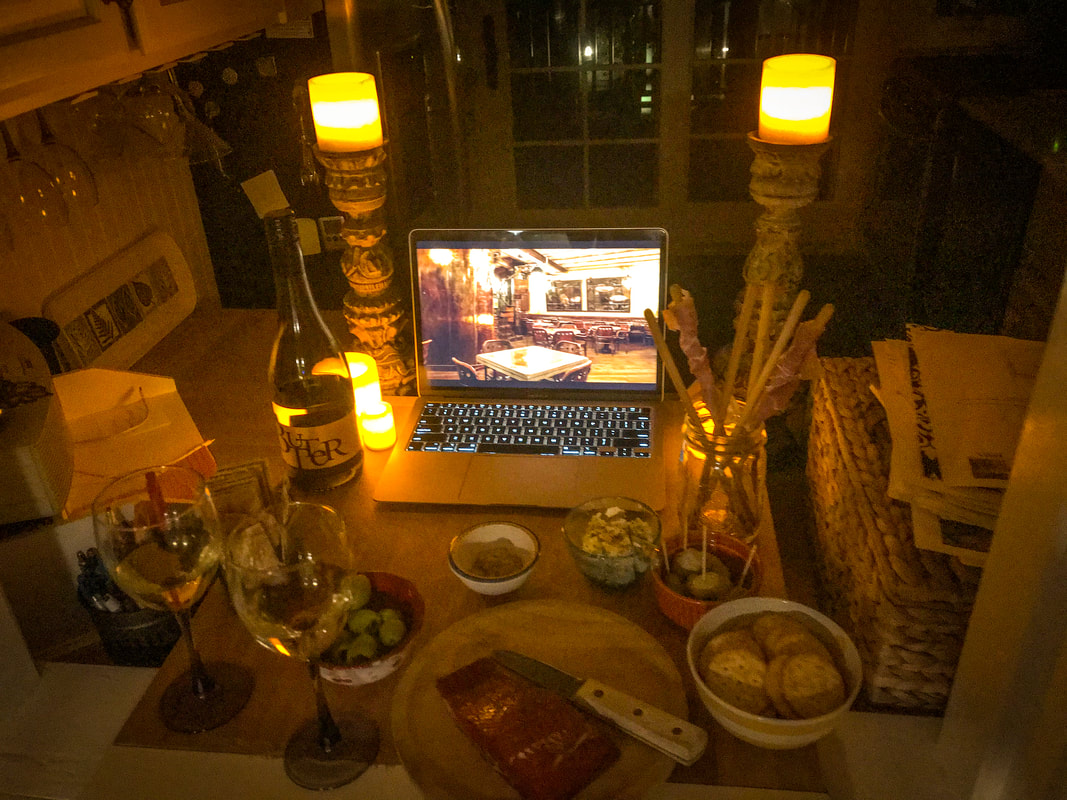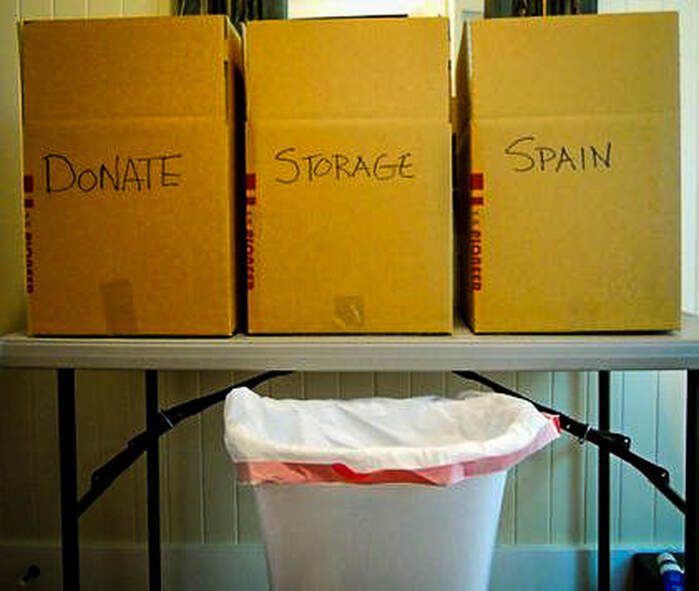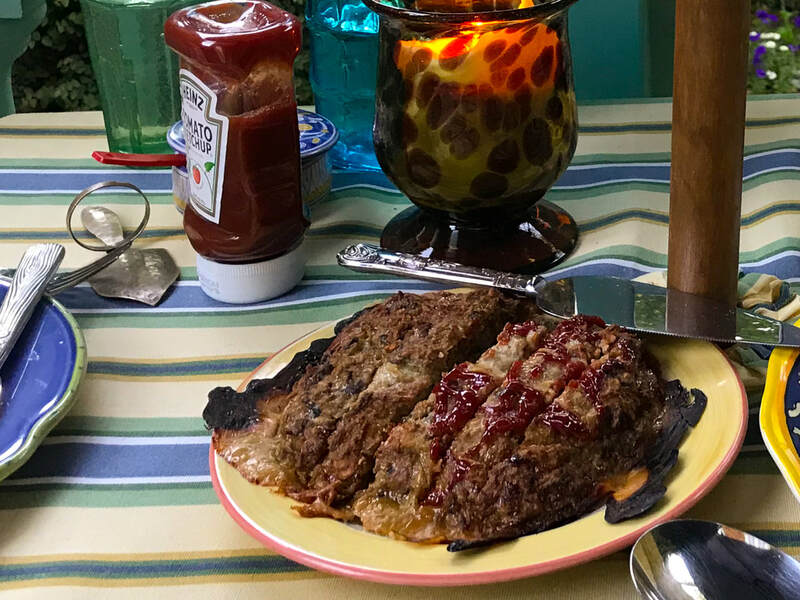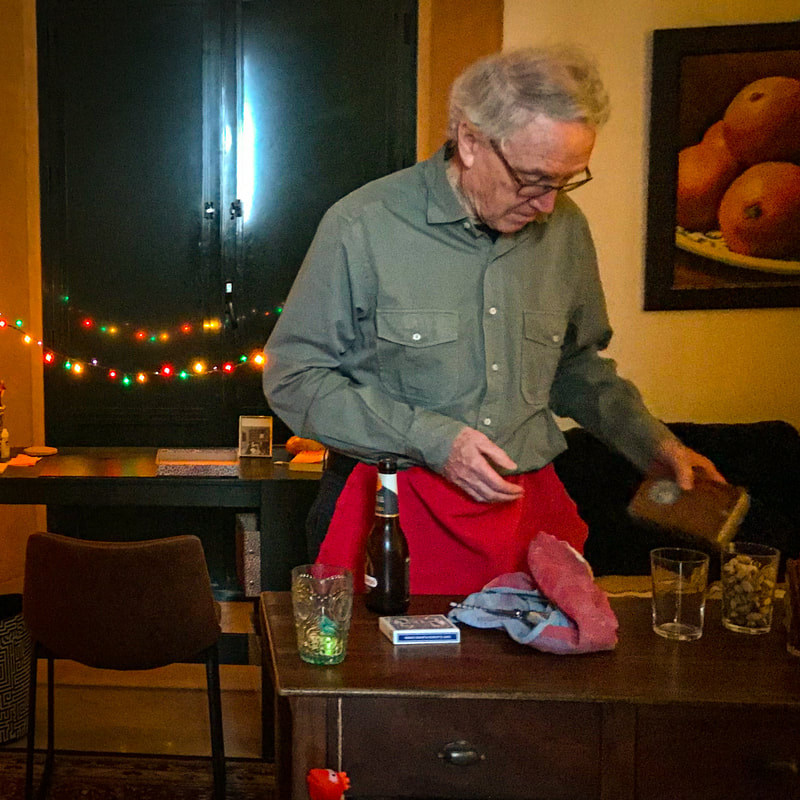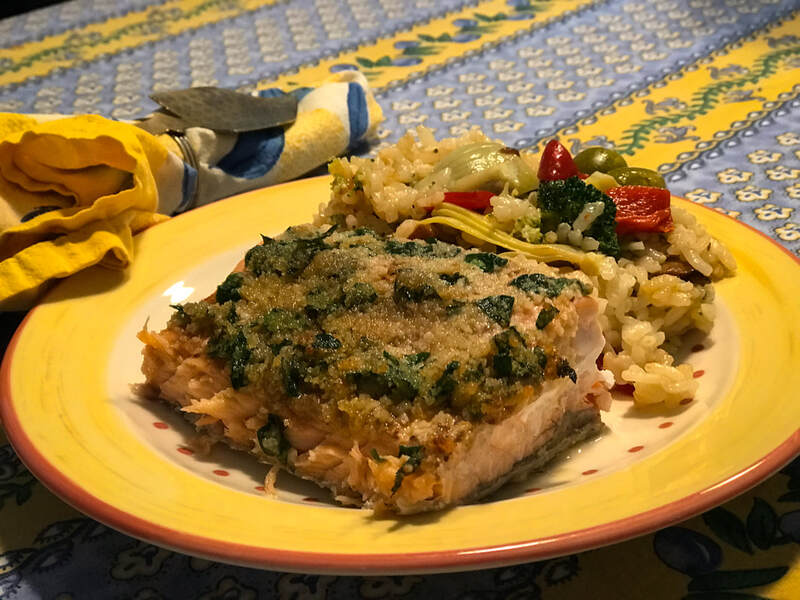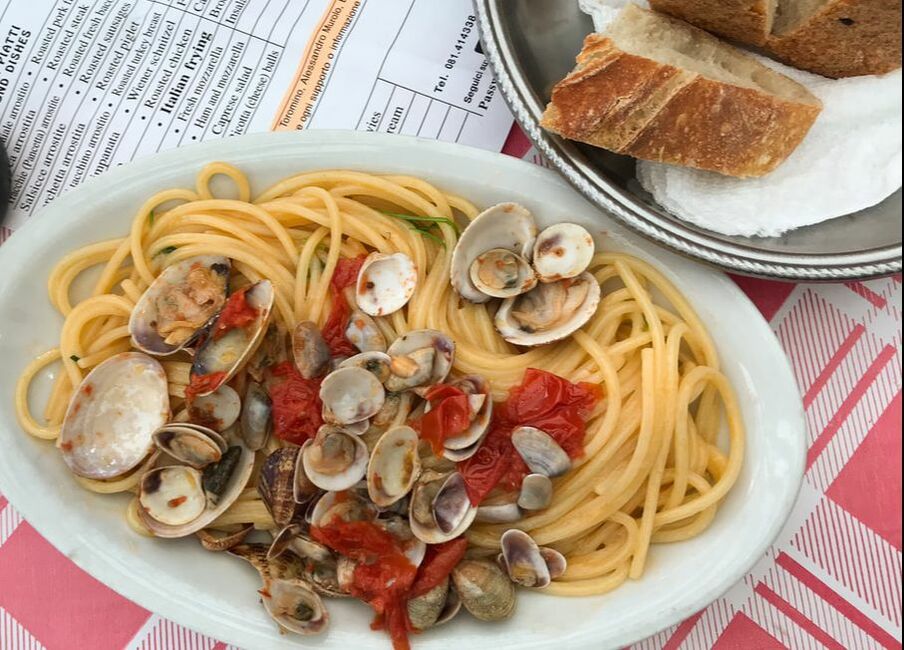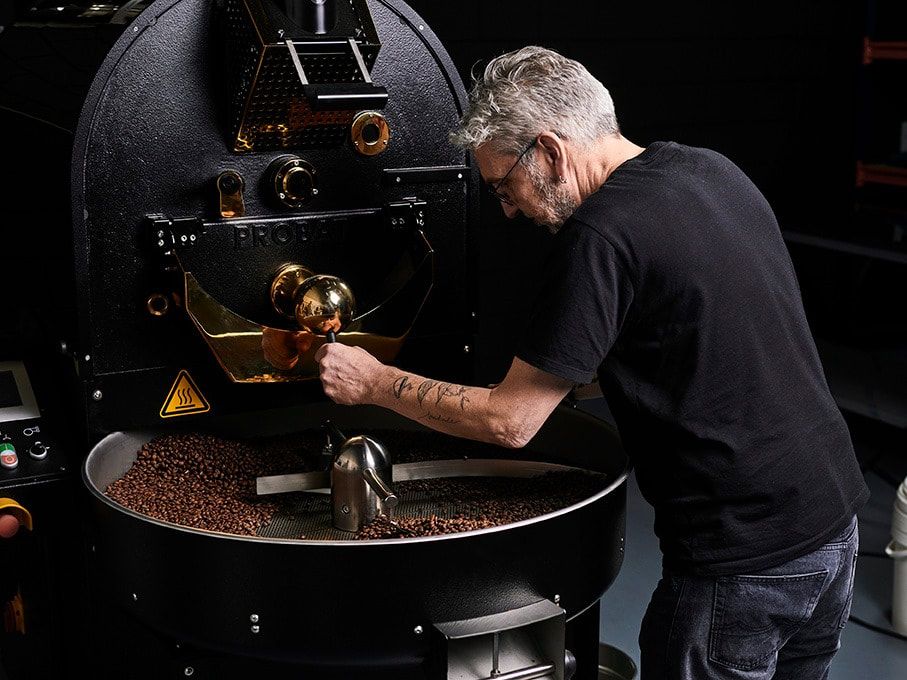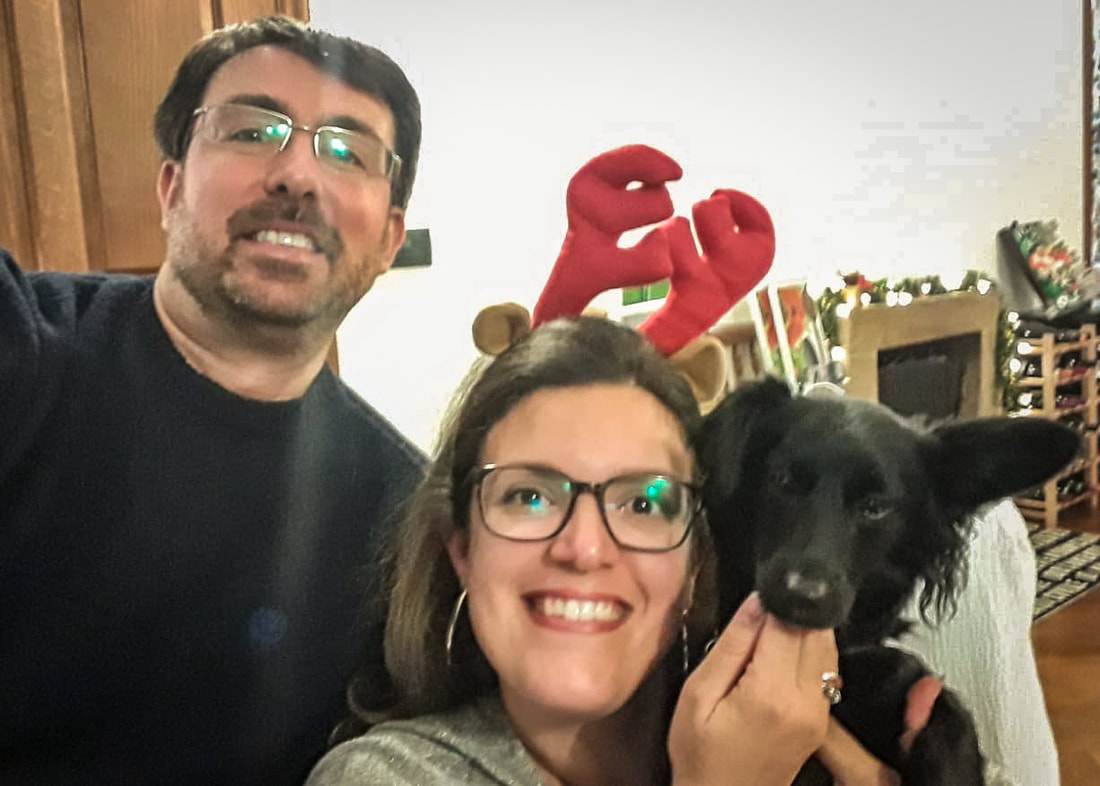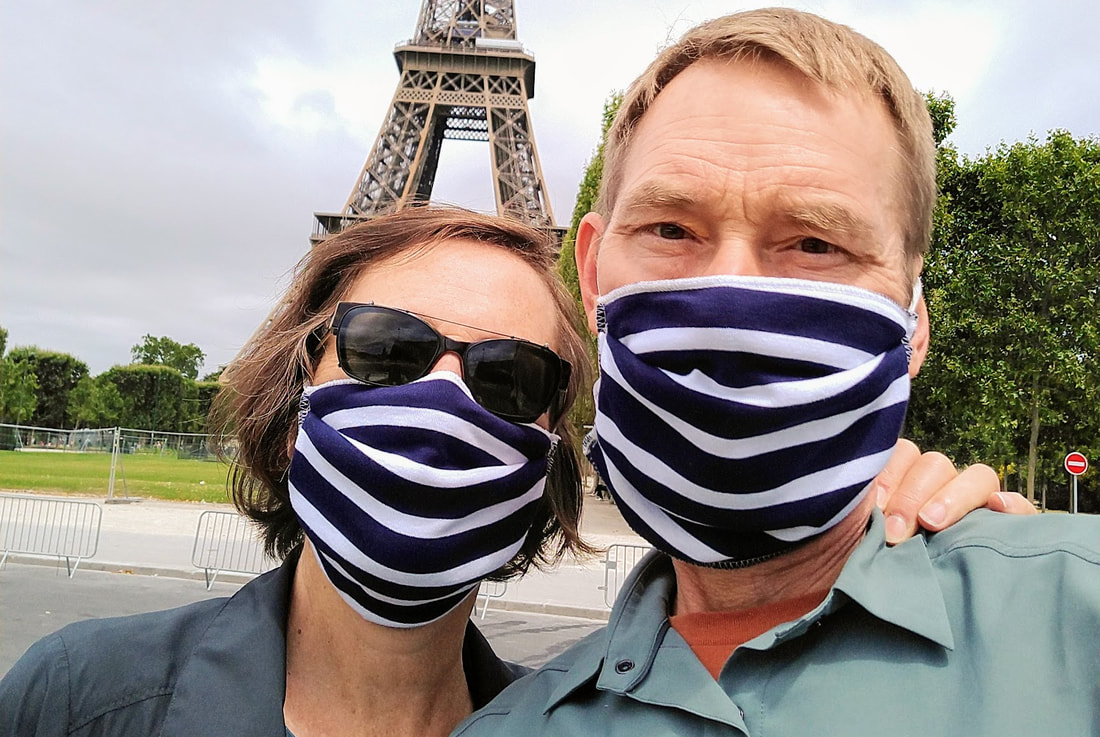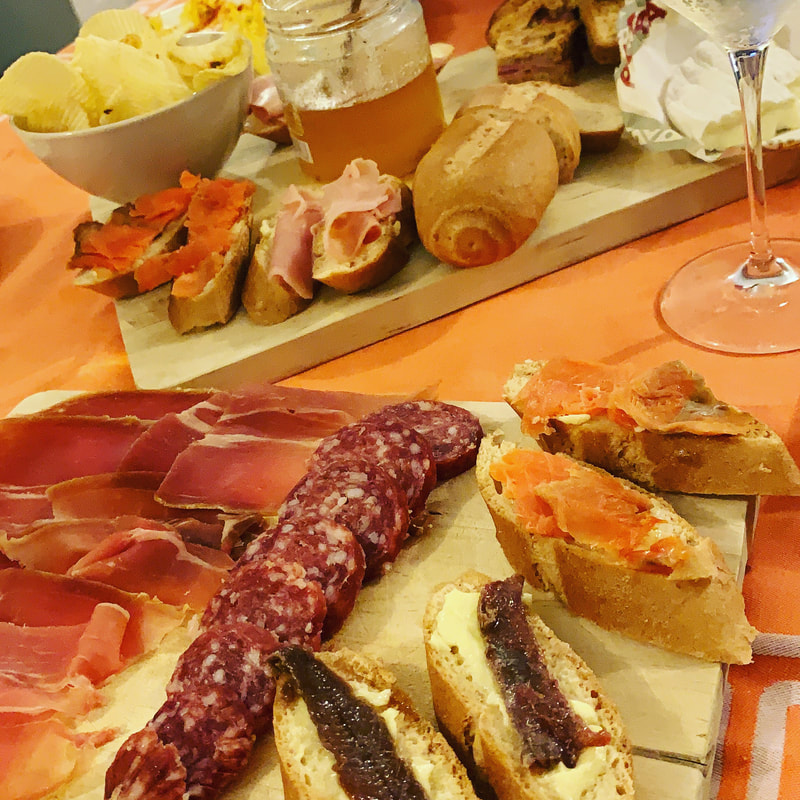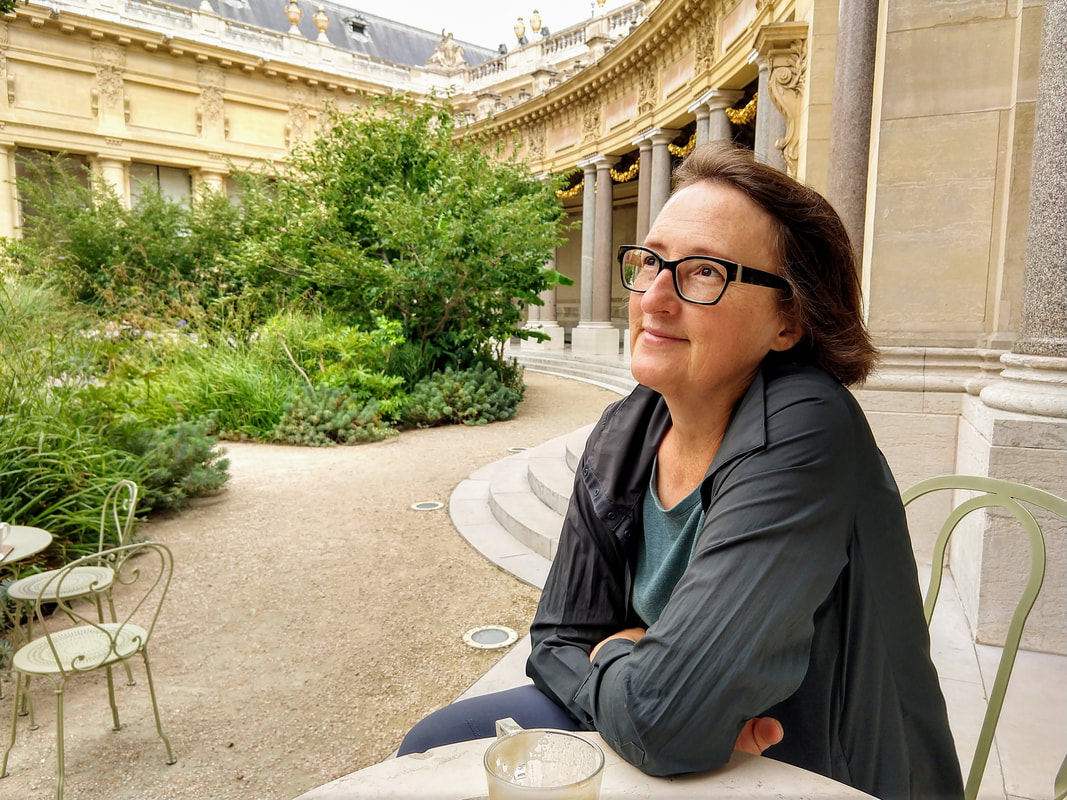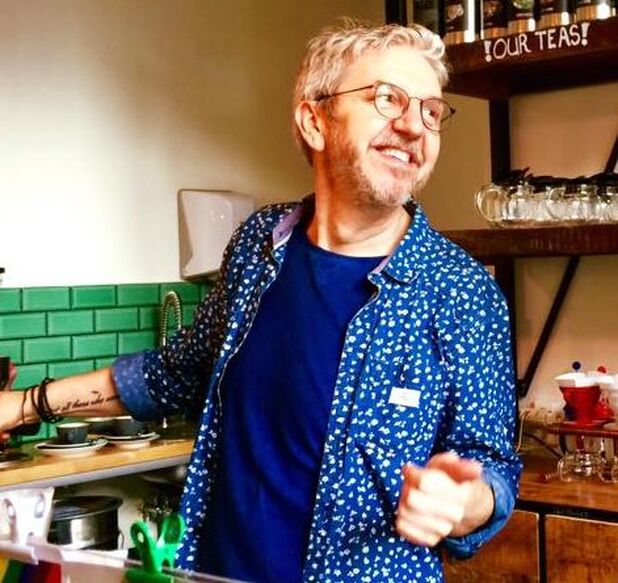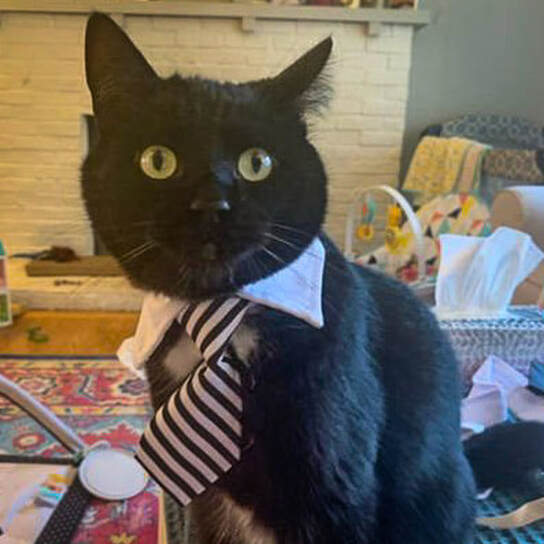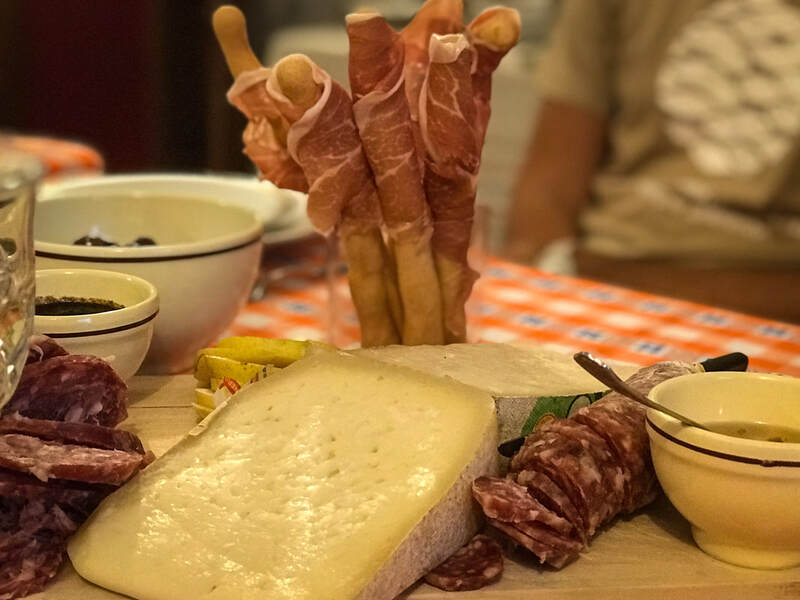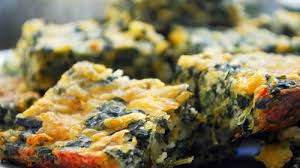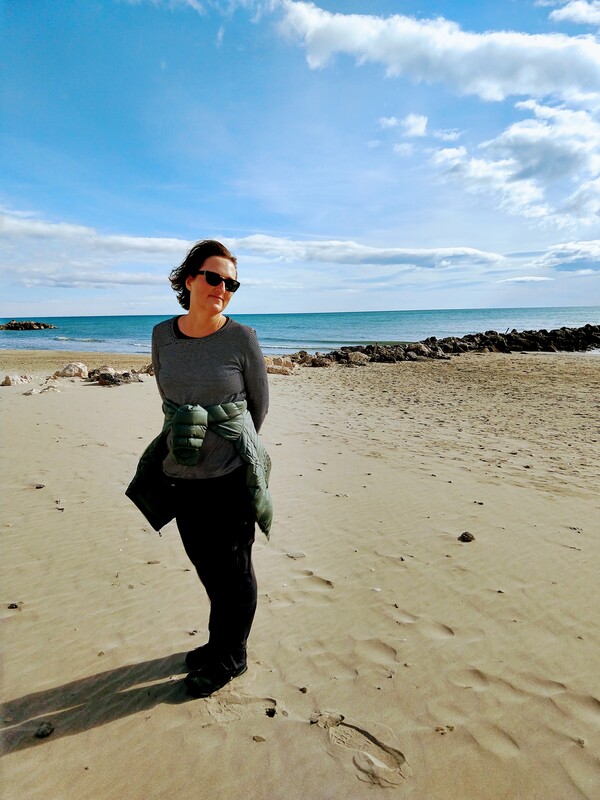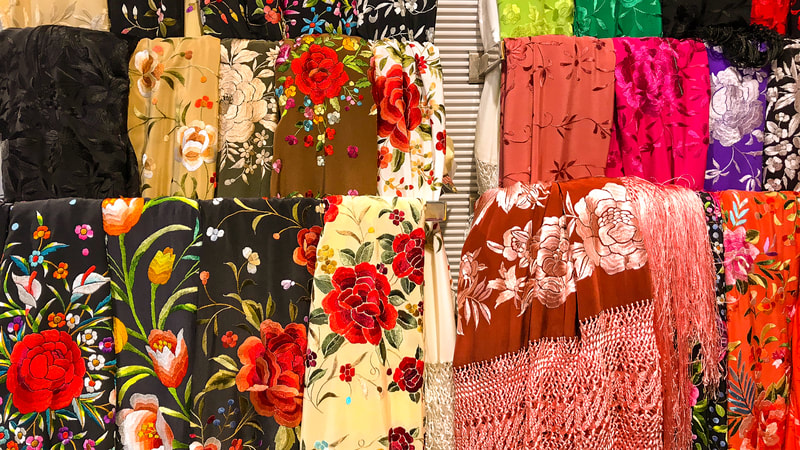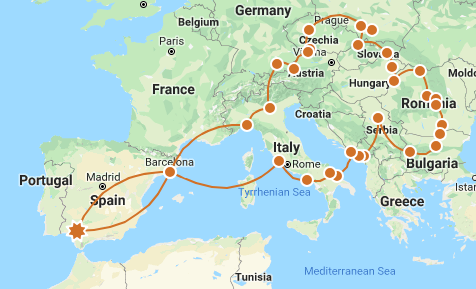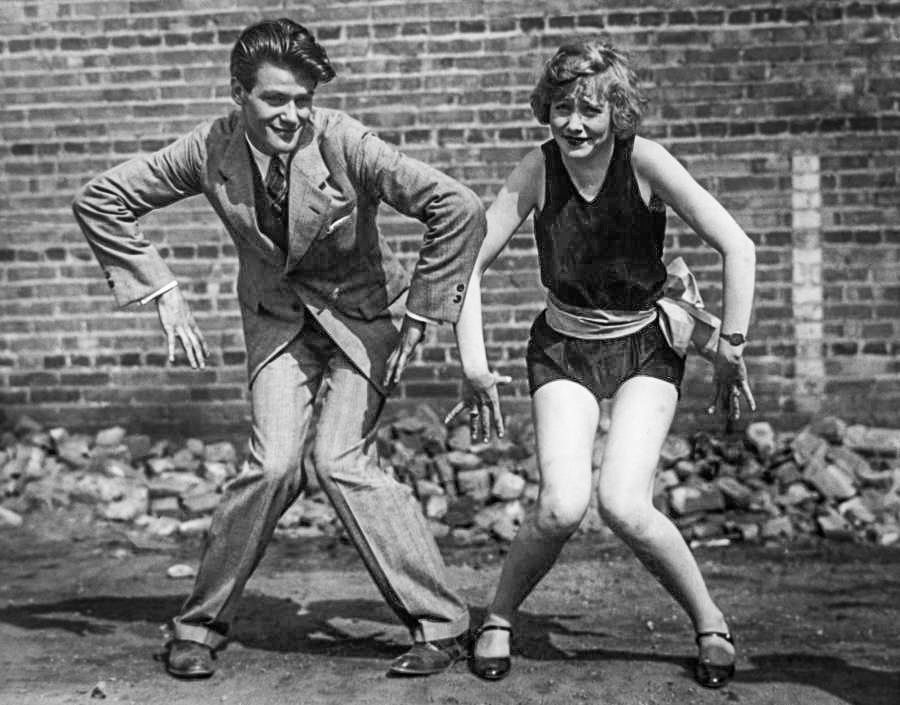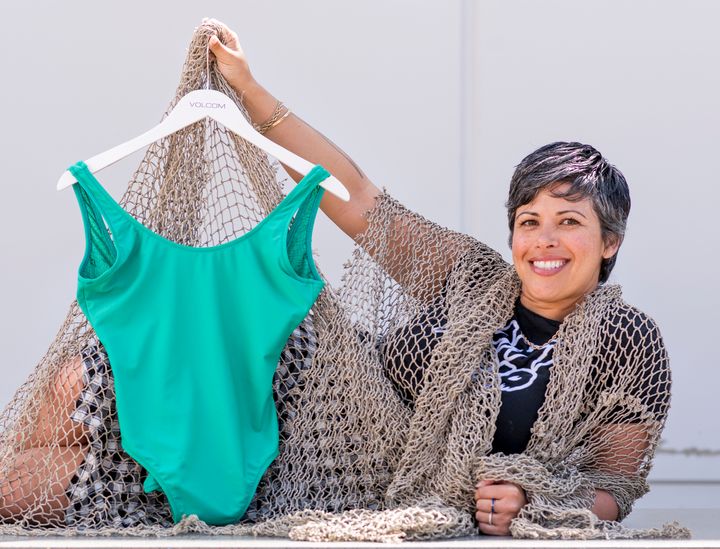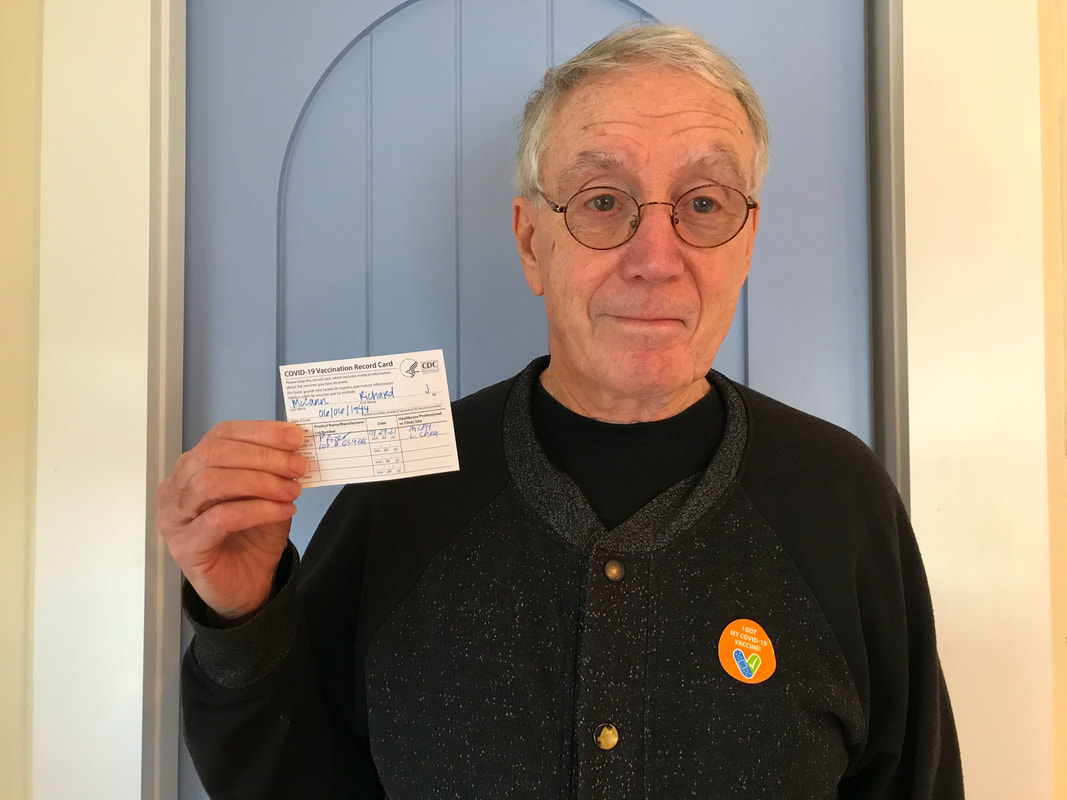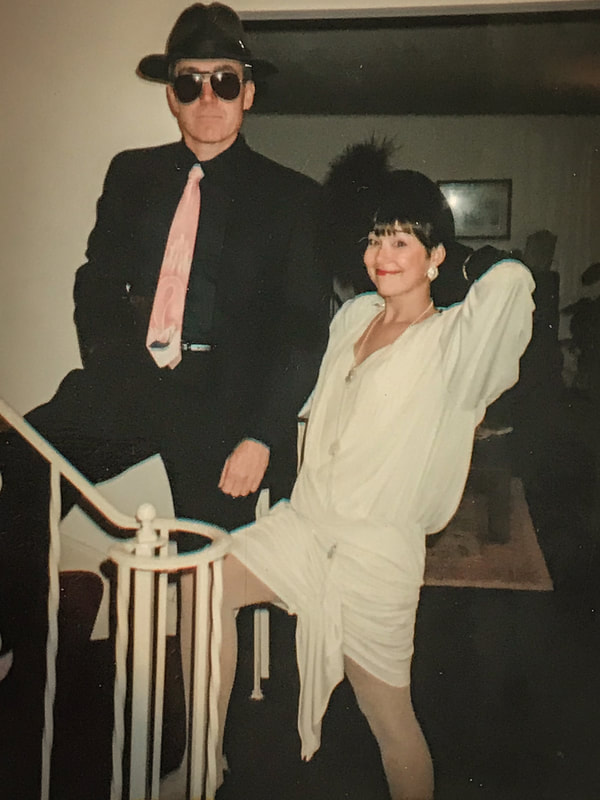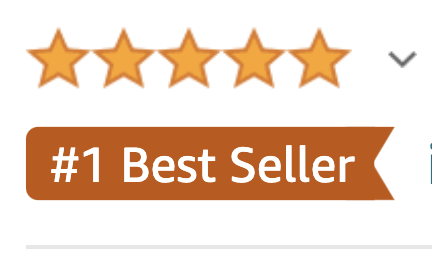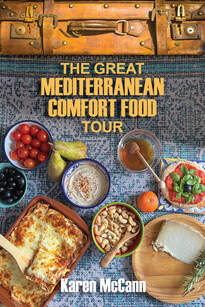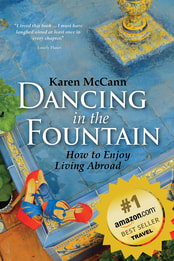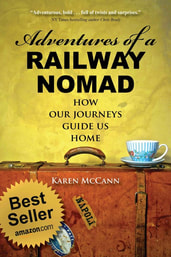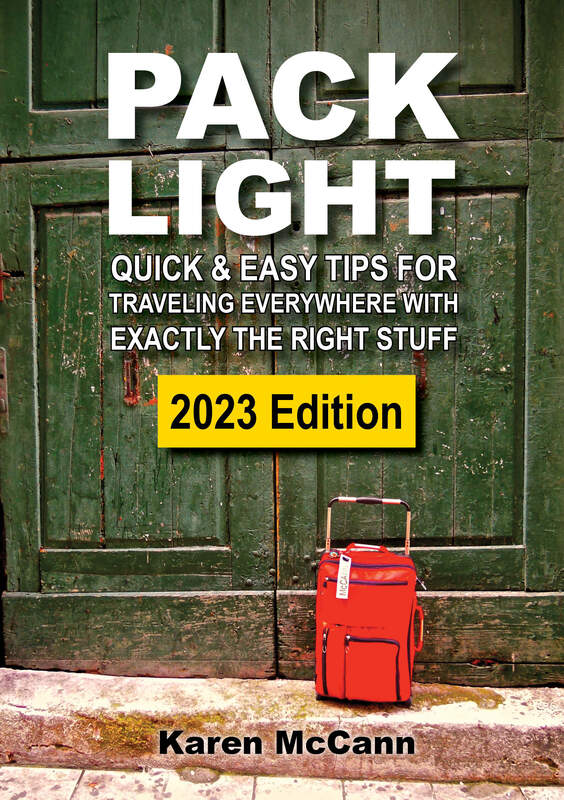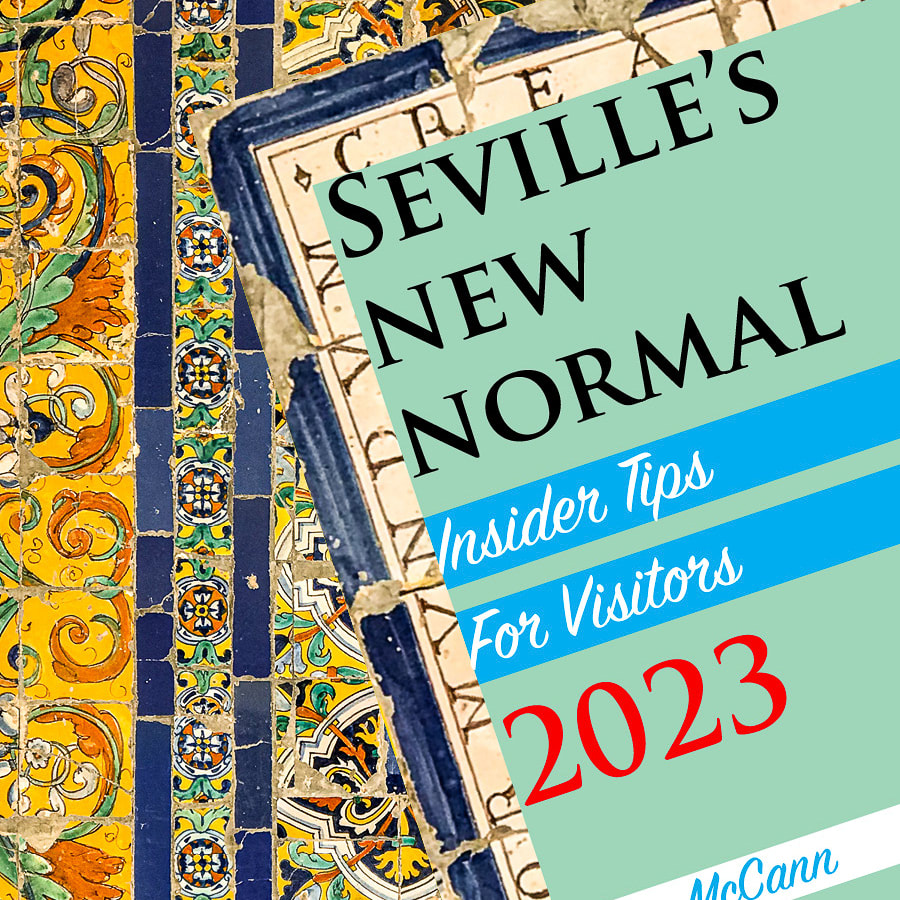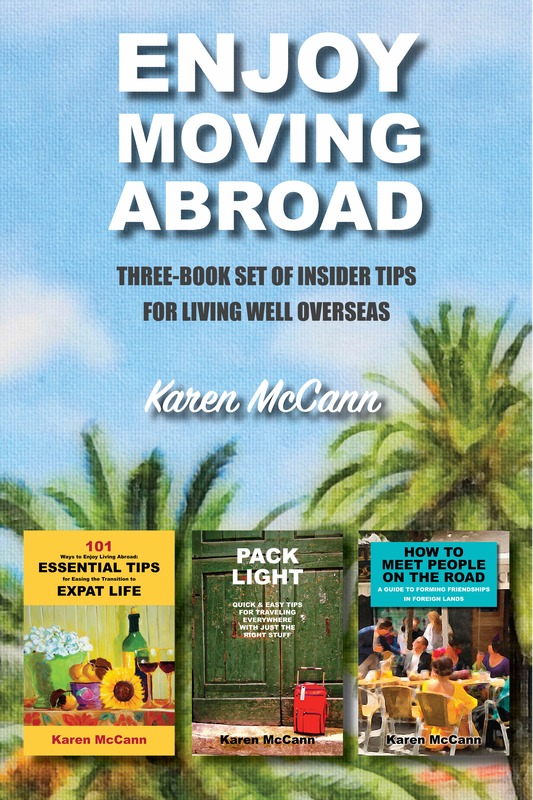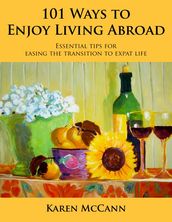|
“Imagine that scientists have created a happiness machine. A machine that could make you as happy as you like with the push of a button. Would you use it? Would you push the button?” asks Dacher Keltner, director of UC Berkeley’s Greater Good Science Center. “I’ve asked that question of my students for years, and most of them say no. Most of them want to find true happiness on their own, in a genuine way. But how do you do that?” Great minds have been debating that one for the entire 200,000 years Homo Sapiens has had the power of speech. And today, my husband, Rich, is going to put in his two cents worth on the subject, having just completed the Science of Happiness course presented by Keltner and Emiliana Simon-Thomas, science director of the GGSC. “I consider myself to be a happy person,” Rich told me in an exclusive interview at our kitchen table. “I became interested in the question of why. I wanted to know what it takes to be a happy person. Also, my wife encouraged me to do it.” “She sounds like a very wise woman,” I replied. “What did you learn?” “Probably the biggest surprise was that 50% of your happiness is inherited, 10% is your life situation, such as your profession and how comfortable you are economically, and 40% is what you do with your life and how you view your life.” “How can you inherit happiness? Is it built into your DNA?” “A surprising amount is physiological,” he said. “For instance, the vagus nerve runs from the brain throughout the body. Some are born with more of it. It’s the thing that responds physically when you see a beautiful sky that takes your breath away.” Simon-Thomas has said that “Physically speaking, our vagus nerve represents our sense of connection and closeness.” Rich added, “There’s a dopamine stimulator in the brain called Oxytocin (not to be confused with the opioid OxyContin). The more it’s stimulated, the more caring people are. Again, some of us are just born with more of it.” Obviously there's not much we can do about our DNA, but we can work with the 40% of happiness that is under our control. “Being happy takes a lot of work,” Rich said. For a start, you can't go after it directly. “If you’re seeking happiness all the time, you are going to fail. Life doesn’t work like that. Happiness is really a byproduct. The ancient Greeks called it eudaimonia, human flourishing and blessedness, achieved by a life of virtue and ethical wisdom. Contrary to what it says in the Declaration of Independence, you can’t pursue happiness; you pursue something else and receive happiness.” “Like what?” I asked. “What can you pursue in life that will lead to flourishing, blessedness, and happiness?” “Help others and show gratitude,” he replied promptly. “It’s all about kindness. Kindness leads to compassion. Compassion leads to altruism. Compassion makes you want to do something for others; altruism is actually doing it. All that is totally different from empathy, pity, or sympathy, which don’t call you to action. 'I feel your pain' isn’t action and doesn’t lead to happiness.” “How do we start?” I asked. “The Buddhists tell us to stay present to what’s going on. And listen. One of the skills they encourage in this course is listening. Humans go mind-wandering 45% of the time; instead of focusing on the present, the mind is drifting into the past or future.” Paying attention, he said, lets us notice opportunities to help others. “It’s the little things. Like the time you helped that old lady up the steps of the café in Greece. Or the other day, when we passed those two beggars and one said, ‘Spare any chocolate?’ and you had some in your purse so you gave it to them.” I had to laugh, remembering the surprise and delight on the beggars’ faces; they’d been kidding around with the request, and now they were each holding a foil-wrapped square of high-end dark chocolate with sea salt caramel — something I know from personal experience will brighten anyone’s day. The four of us laughed together and parted on a little buzz of joy. “I get how helping others makes you happy,” I said. “Where does gratitude fit in?” “Expressing gratitude is underrated; we rarely do it except in eulogies. The presenters suggested writing a letter to someone who did something you appreciate, and then calling them up and reading them the letter. They also recommended keeping a gratitude journal, or developing a nightly habit of climbing into bed and thinking of three things you’re thankful for from your day.” I heard lots about this a few weeks ago, when Rich was going through the gratitude section of the course. That Sunday, I suggested we each bring to lunch three objects representing things we were thankful for. I showed up with three small boxes. One held the heart-shaped locket Rich gave me for our 30th wedding anniversary. The second held pieces of wisdom I’d scribbled down on Post-It notes and pasted above my work desk, such as “Never chase a missed train … get a pastry and wait for the next one.” The third box held the keys to this house, our safe haven during quarantine. “Taking this course during pandemic gave me the opportunity to reflect more deeply,” Rich said. “When everything is ‘normal’ you tend to accept things as they are. Now, faced with a life-changing situation, you can view it as an opportunity to learn or an impediment. The pandemic allowed me to learn about myself in a difficult situation. When daily stuff gets me aggravated — yes, I’m thinking of our struggles with the Spanish bank — I try to see it in the context of all the small, good things happening to me, and ask myself if it’s really that important.” He thought for a bit, and then he added, “Even in these challenging times, you can find small blessings that make you grateful. And those blessings make it possible to remember that every day is sacred.” Has anyone done something kind for you lately? What are you grateful for these days? Have moments of joy helped you survive the pandemic? If there was a happiness button, would you press it? Please let me know in the comments section below. YOU MIGHT ALSO ENJOY This post is part of my ongoing series of articles on surviving the pandemic, if possible with some remnants of our sanity and good humor. Each week I provide tips, strategies, and reasons for hope.
Sign up HERE to get free stories in your inbox each week. Feel free to share this post link with family and friends. https://www.enjoylivingabroad.com/my-blog/the-happiness-course-rich-tells-all
31 Comments
It’s been one of those weeks — the kind that makes you think your head’s going to explode. For a start, Rich and I were enmeshed in a ghastly tangle with our Spanish bank involving a new pin number they’d sent out of the blue, texting it to our Seville phone number — which isn’t operational. No pin, no online banking. Not good. Multiple emails and phone conversations later, the bank grudgingly texted a new pin to our US phone. It didn’t work. Over Skype, the woman at the bank explained protocol now required sending the next pin by snail mail to our Seville apartment. At this point, the screen went dark and silent. “We’ve been cut off,” I said. Rich and I then proceeded to vent our feelings about the bank and its pin protocols, expressing ourselves with a good deal vigor for about five heated minutes. When we finally began to wind down, we heard the woman at the bank say brightly (in Spanish), “So, is there anything else I can help you with today?” Ooops! Apparently we were still on the line with her. Abashed, I mumbled “No, gracias,” and hung up. Then came good news from the county: my age group (65+) was now eligible for the Covid vaccine. In the stampede for appointments, every time I logged on, it was already too late to get on the list with my provider, the county health department, or a pharmacy. Rich, determined to find an open time slot, took it on as a personal vendetta. Meanwhile, a friend in Seville retrieved the bank’s letter and emailed us the new pin. Surprise! That didn’t work either. “It’s like one of those ransom movies,” I said. “Where the kidnappers make the guy with the money race to a phone booth only to be sent on to another and yet another.” “Yeah, except this time, they’re holding the money hostage.” I realized we needed something to take our minds off all the bother and frustration. “Date night on Saturday?” I said. Date nights have become one of our key pandemic strategies. We rely on them to break up the routine and refresh our minds, hearts, and spirits. If you’ve never done a date night at home, it’s really quite simple: all you need is food and some form of entertainment that sparks a conversation that isn’t about the pandemic, politics, or Spanish banking. It helps to find a fresh location to eat; we often use a folding table, the coffee table, even the floor in places like the living room or foyer. The point is to make the night feel different from the hundreds that have gone before. If it feels different, so do you. Saturday was pub night. The food was the sort of casual stuff you’d nibble in a bar: smoked salmon, bread sticks wrapped in prosciutto, goat cheese with rosemary, olives, artichoke hearts, and of course, wine. (Yes, I was inspired by Carlotta’s aperitivo in last week’s post.) I’d sprung for some high-end shrimp too, but when I opened the fridge, worrying smells emanated from the deli drawer. Recalling with a shudder the time Rich ate dubious shellfish in Mexico (you do not want to know the details), I wasted no time in flinging the shrimp into the outside trash bin. No matter, we had plenty to munch on. I arranged the food on "the bar," a big wooden cutting board set in the pass-through between the kitchen and dining area, then dragged over a couple of tall stools. To set the mood, I played a YouTube video of a pub with music and background chatter. I turned down the lights, added candles, and suddenly this everyday space was transformed into a cozy, intimate tavern. Once everything was in place, I went upstairs to collect Rich. For both of us, one of the most delightful parts of date night is the anticipation. When it’s Rich’s turn to arrange things, I sit upstairs listening to the bustle below, sniffing whatever delectable scents are wafting out of the kitchen, trying to guess what he’s got planned. I’ve written about some of these evenings: 1950s sci fi (The Virus That Saved Humanity), dive bars (Bar Hopping, Quarantine-Style), and winter wonderland (Relax: Nobody's Cancelling the Holidays). Others include a drive-in movie (on the couch), picnics (indoors and out), sunbathing (hot lights and beach towels), and themed film nights (Hitchcock classics). Scrolling for ideas, I’ve read plenty of articles about date nights written by people who have obviously never experienced one. “Read your favorite novel aloud” to your partner? That would take an average of eight to thirteen hours. Are we supposed to stay up till dawn? “Tackle a DIY project like painting a room together.” Yes, that wouldn’t be at all stressful at the end of a tense week. The most bonehead idea I heard (and I am not making this up) was “Clean out your closets.” Seriously? Clean out your closets as a way to reconnect with your soul mate? If Rich ever suggested that one, we’d be spending our next date night having a Zoom conference with a marriage counselor. And then there’s “Just talk.” As you may have guessed, Rich and I are both champion chatterers, but after approximately a billion hours of one-on-one this year, even we need some fresh material. Sources such as 36 Questions: How to Fall in Love or 350 Good Questions to Ask have sparked hours of stimulating discussion. Here’s a sampling:
For many of us, the answer to that last one would be the video of the lawyer whose Zoom filter made him appear to be a talking cat. How did this happen? According to a 12-year-old in a YouTube video (and I think we can all agree that’s as expert as you get), you simply install Snap Camera and choose a filter, showing up for online dates as a cat, a pirate, or a talking potato with a halo of hearts. For now, I’m keeping my dates real and low tech. And Saturday night certainly needed no enhancing; we were celebrating Rich’s triumph in securing my first vaccine appointment. One of the lesser pharmacy chains had such a convoluted sign-up form that anyone with any sense soon abandoned hope and went elsewhere. But to Rich, a hardened veteran of the Spanish banking system, it was child’s play. I’ll be getting my inoculation this week, most likely just about the time you read this. Hallelujah! It’s almost enough to give me hope of someday getting back into our Spanish bank account. Have you ever done an at-home date night? What else is helping you stay sane in these crazy times? Let me know in the comments below. YOU MIGHT ALSO ENJOY
This post is part of my ongoing series of articles on surviving the pandemic, if possible with some of our sanity and sense of humor intact. Each week I provide tips, strategies, and reasons for hope. Sign up HERE to get free stories in your inbox each week. Feel free to share this post link with family and friends. https://www.enjoylivingabroad.com/my-blog/how-and-why-to-have-great-date-nights-at-home I was both charmed and staggered to learn, when Spain first went into lockdown last year, that hairdressers were deemed essential workers. “Otherwise, how are old ladies supposed to manage if they can no longer wash their own hair?” said officials, no doubt breaking into an icy sweat at the idea of having to justify salon closure to their feisty abuelas. In France, recurring quarantines require closing all shops except those selling bare necessities. “Thankfully,’ remarked my friend Maer, “the French consider wine, pastries, and chocolates to be necessities!” Les Européens are so civilized, n'est-ce pas? I began wondering: Are Europeans finding ways to turn lockdown into a viable lifestyle? Are they learning how to adjust in ways that we haven't considered here in the US? When I reached out to friends in France, Italy, and the Netherlands, they poured out tales of much tighter restrictions on commerce, socializing, and mobility than anything we've seen in the States. And then — human nature being what it is — they explained how some people are circumventing them. “We are currently in our third lockdown with a nightly curfew. Be indoors by 9:00 pm and you can be back on the streets by 4:30 am,” says my friend Patrick, the Irish owner of the popular Amsterdam coffee house Monks Coffee Roasters. Lockdown requires non-essential shops to close. “This is being flouted like a badly run speakeasy with unmarked bags and bizarre hand signals. The basic rule of law is, if you sell food or medicine, you can open your doors. ‘You want fries with those new pants/washing machine/garden chairs?’” Naturally I asked how everybody was staying (relatively) sane. “Good question!” says Carlotta, an Italian tour guide and chef living in Turin, Italy with her boyfriend Paolo. “I would love to answer that I made the most of all this free time by doing a lot of exercise and eating well; the reality is I've been eating more comfort food than ever! What kept us sane during the toughest times was our dog, Luna; we adopted her in early March 2020, by chance just before the first lockdown started. She is our furry princess, she's the funniest and most sociable dog ever, and she gave us a legal reason to get out for a walk when it was forbidden!” “People are renting dogs on leash time,” reports Patrick. “I’ve also heard of cat walking taking hold, but can’t confirm.” It gets crazier than that; in March the Spanish news showed locals walking plastic dogs, chickens, even goldfish; the police were not amused and soon put a stop to it. “If I could avoid doom-scrolling, I would be saner,” observes Maer, an American living in Montpellier, France, with her husband, Mark. “We’re retired from the film industry and I think that has ruined TV and most films for us. We can no longer manage that wonderful suspension of disbelief they require. We get bored and wander off to read.” They also take online classes, including Yale’s Science of Well-being (similar to Rich’s UC Berkeley happiness course). Patrick and his Dutch fiancé, Margreit, amuse themselves with AI. “We got one of those ‘Hey Google’ speaker things," he says, "and although it was slightly creepy at first, we enjoy the randomness of asking her questions, teasing her, challenging her, and making her play obscure music. I know, it’s a machine, but hey, beggars can’t be choosers; she’s the only stranger you're allowed to have in your house at the moment.” Carlotta says she and Paolo “do an aperitivo on Fridays to cheer ourselves up. Every week I put together something different: olives, a good salami, some mortadella cubes, a selection of cheeses, croutons with butter and anchovies, salmon, ham, savory pie... you name it! We open a good bottle and do a little ‘party,’ just the two of us.” Her favorite comfort recipe: spinach squares. [Carlotta’s Spinach Square Recipe] Patrick just moved and will be kitchenless until March. “We live with a loan microwave oven and takeaway food. Not great but we’re still alive … just. Once the kitchen arrives, the first thing I will prepare is my sensational Shepherd’s Pie. It’s a secret recipe handed down through generations of my family.” Oh yes, I talked him into sharing it with us! [Patrick’s Shepherd’s Pie Recipe] Everyone struggles. “I work in tourism," says Carlotta, "and the biggest challenge is figuring out when I'll be able to work again and how tourism habits will change. The second biggest challenge is fitting in clothes after all that comfort food!” For Maer, staying put is hard. “My main jam is going places, walking around and looking at things; having to cool my heels has been tough. But then I realize that the only thing wrong with my present moment is my idea of how the future will be. If I manage to turn that off, all is well. We’re warm, dry, well-fed, and well-befriended, and that’s enough.” At the coffee house, Patrick deals with maskless conspiracy theorists and other tests to his patience and diplomacy. On a personal level? “The biggest challenge I faced was grief. We lost two family members back in Ireland to Covid, and being unable to be at funerals due to travel restrictions was difficult. My aunty was a particularly close person to me and watching on a computer screen my mum, that I haven’t hugged for over a year, at the coffin of her sister was heartbreaking.” None of them expects to be vaccinated any time soon. Carlotta and Maer are hoping for fall; Patrick says, “By Christmas.” All three feel they’ve learned a lot during lockdown. “I had the illusion to be in control my future; well, that was a big fat lie!” says Carlotta. “I'm learning to enjoy the simple things that I have always taken for granted.” The pandemic, observes Patrick, “made me realize how entitled and indulged we are as a species. Personally I took stock of what I had and how much I actually need.” Maer echoes this sentiment. “It’s a superpower to be comfortable with very little.” When I asked Patrick if he thought the world would ever return to normal, he said, “There is never really a ‘normal.' We are always evolving. Now there is a shift in mentality and behavior, and I think it’s a good one. I’m hopeful for humanity as a whole. Fighting a pandemic as opposed to a war has made the planet smaller and made us realize how very vulnerable we are.” “Holy smokes are we all interconnected,” says Maer. “The butterfly effect is very real.” This has been a rough time for everyone. As one gastroenterologist put it, using the terminology of her field, “If 2020 was a drink, it would be a colonoscopy prep.” While 2021 offers reasons for cautious optimism, the pandemic is far from over, the outcome still uncertain. “At the beginning I thought we would return to a better normal,” says Carlotta. “Now I just hope it won’t be worse. But I can’t hide a sparkle of hope for us to learn a lesson and be a better society.” Amen to that! How's your pandemic going? Any tips for adapting gracefully to the new abnormal while we wait for our vaccines? This post is part of my ongoing series of articles on surviving the pandemic, if possible with some of our sanity and sense of humor intact. Each week I provide tips, strategies, and reasons for hope. Sign up HERE to get free stories in your inbox each week. Feel free to share this post link with family and friends. https://www.enjoylivingabroad.com/my-blog/europes-creative-ways-of-adapting-to-the-new-abnormal YOU MIGHT ALSO ENJOY “Debauchery!” said my sister-in-law Deb in our last Zoom call. “I just read that things won’t get back to normal until 2024 and then we’ll have a wild period of debauchery!” These days everybody’s got a theory about how things will look “when all this is over.” Some financial types say this decade will mark the end of the world economy — “driving the last nail into the coffin of the globalists,” as one put it. Psychologists fear many of us will never hug, shake hands, or even leave our homes again. Inspired by predictions that das volk will continue avoiding bars, a German publication announced “the end of the night.” Some sociologists suggest young people will no longer engage in casual sex. Malarkey, applesauce, and horsefeathers, say I. Clearly these prognosticators have forgotten about a little thing I like to call “human nature.” People always have — and always will — strive to make a buck, seek congenial places to raise a glass, and find opportunities to fool around. That’s why the debauchery prediction actually made sense to me. I tracked down the author, who turned out to be Dr. Nicholas Christakis, an esteemed Harvard-educated social scientist and physician who is running Yale’s Human Nature Lab. One of his areas of expertise is how our behaviors influence contagion in society. As you can imagine, his thoughts are in hot demand these days. 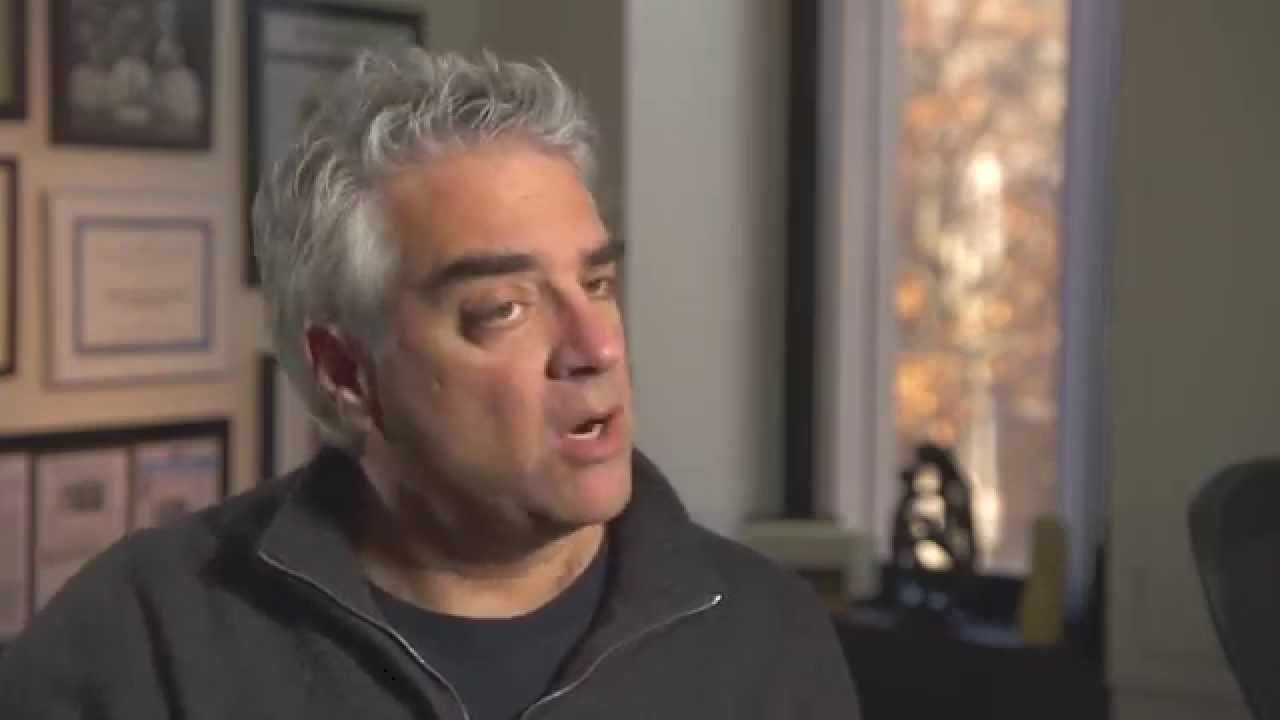 “Many people seem to think it’s the actions of our government that are causing the economy to slow – that’s false,” says Dr. Nicholas Christakis. “It’s the virus that’s causing the economy to slow, because economies collapsed even in ancient times when plagues happened, even when there was no government saying close the schools and close the restaurants.” “Plagues are not new to our species — they’re just new to us,” observes Christakis. “During epidemics you get increases in religiosity, people become more abstentious, they save money, they get risk averse, and we’re seeing all of that now — just as we have for hundreds of years during epidemics.” The biggest difference this time around? “We’re the first generation of humans alive who has ever faced this threat that [can] respond in real-time with efficacious medicines. It’s miraculous.” He suggests vaccination will take all of 2021, and we’ll need the next two years to recover from the socioeconomic devastation left in the pandemic’s wake. And then? Look out, world! Christakis predicts “another Roaring Twenties” like the one that followed the 1918 flu pandemic. When it comes to eras, the original Roaring Twenties was, as they said back then, the “gnat’s eyebrows.” Having survived the twin traumas of World War I and the flu pandemic, our nation enjoyed a booming economy and was ready to release its pent-up desire to make whoopee. Women, energized by winning the right to vote, were busy breaking taboos: bobbing their hair, smoking cigarettes, wearing dresses that (gasp!) bared the knee, and getting fitted for (I blush to mention it) diaphragms for birth control. African Americans introduced the world to thrilling new music that gave the era its other name: the Jazz Age. Prohibition tried to put a lid on things, so public-spirited members of the underworld quickly set up speakeasies to provide enough giggle water to keep everyone zozzled. The economy doubled in just nine years, and with so much extra voot jingling in their pockets, people bought radios — creating mass communication, the advertising industry, and modern consumerism. Egged on by radio sponsors, everyone spent as never before on stuff they’d never heard of and often didn’t need. And we’ve never stopped. One of the hottest controversies in the “when all this is over” debate is whether or not we’ll revert to the cycle of compulsive consumption that Madison Avenue has spent a century programming us to believe is not just normal but our patriotic duty and one of life’s great pleasures. “The mutation of shopping from buying necessary stuff to being a leisure activity — “retail therapy” — has been one of the most miserable cons of modern life,” writes Guardian columnist Suzanne Moore. “If anything good has come out of this awful time, it is this … a pause in mindless consumption. ‘When the going gets tough, the tough go shopping,’ they used to say. Well, it’s no longer true, if it ever was.” “If all this consumption was making us deliriously happy that would be one thing,” points out Harvard economist Juliet B. Schor. “But in fact what we find is after intense desires to acquire goods, Americans are discarding them at record rates.” How much stuff are we throwing away? Pre-pandemic it was about 300 million tons a year — 4.5 pounds per person per day. Top discards included food (30.63 million tons), plastic (26.82 million tons) and a little further down the list, textiles including clothing (11.5 million tons). I was aghast to learn that while sheltering in place we’ve been generating 25% more trash. All this raises a moral dilemma. I’ve spent decades trying to be a responsible steward of the planet and doing my share of reducing, reusing, and recycling. Back in Ohio I organized our town’s curbside recycling program and Earth Day activities, and nowadays I write a weekly column on climate change for a Seville-based publication. But I live in the real world with conflicting priorities and tough choices. While I flinch at the thought of the amount of Amazon packaging flowing in and out of my house, my pandemic survival strategy involves doing as little in-person shopping as possible. I am well aware that 80% of the people who have died of Covid-19 are in my 65+ age group. Rich, who is 76, has a mortality risk factor 220 times higher than that of young people. I am doing everything I can to keep us both safe. On that front, I have some exciting news: Rich received his first dose of the vaccine. Last Friday he went to the Marin County Fairgrounds, and after a lengthy, chilly wait to get into the main hall, he breezed through the vaccination in twenty minutes. The shot was so painless the nurse had to tell him it was over and he should 23 skidoo. When will I be inoculated? Theoretically soon, but shortages mean they’re delaying my age group a bit longer. Fingers crossed they have enough around for Rich’s second shot in a few weeks. The uncertainty is frustrating, but we feel lucky compared to our European friends, who don’t expect to be vaccinated until September, or possibly December. Christakis may be right that the pandemic and its aftermath won’t subside until 2024. Or it could be pure banana oil. Who knows? As humorist James Thurber wrote, “The past is an old armchair in the attic, the present an ominous ticking sound, and the future is anybody's guess.” But here’s hoping that by 2024 the world is safe enough for us all to indulge in a bit of fun — if not outright debauchery, then a little lighthearted, distance-free socializing, when it’s finally safe to don our glad rags, fire up the flivver, and round up congenial pals for a night of putting on the Ritz. This post is part of my ongoing series of articles on surviving the pandemic, if possible with some of our sanity and sense of humor intact. Each week I provide tips, strategies, and reasons for hope. Sign up HERE to get free stories in your inbox each week. Feel free to share this post link with family and friends. https://www.enjoylivingabroad.com/my-blog/is-roaring-20s-style-debauchery-just-around-the-corner YOU MIGHT ALSO ENJOY |
This blog is a promotion-free zone.
As my regular readers know, I never get free or discounted goods or services for mentioning anything on this blog (or anywhere else). I only write about things I find interesting and/or useful. I'm an American travel writer living in California and Seville, Spain. I travel the world seeking eccentric people, quirky places, and outrageously delicious food so I can have the fun of writing about them here.
My current project is OUT TO LUNCH IN SAN FRANCISCO. Don't miss out! SIGN UP HERE to be notified when I publish new posts. Planning a trip?
Use the search box below to find out about other places I've written about. Winner of the 2023 Firebird Book Award for Travel
#1 Amazon Bestseller in Tourist Destinations, Travel Tips, Gastronomy Essays, and Senior Travel
BLOG ARCHIVES
July 2024
CATEGORIES
All
|
